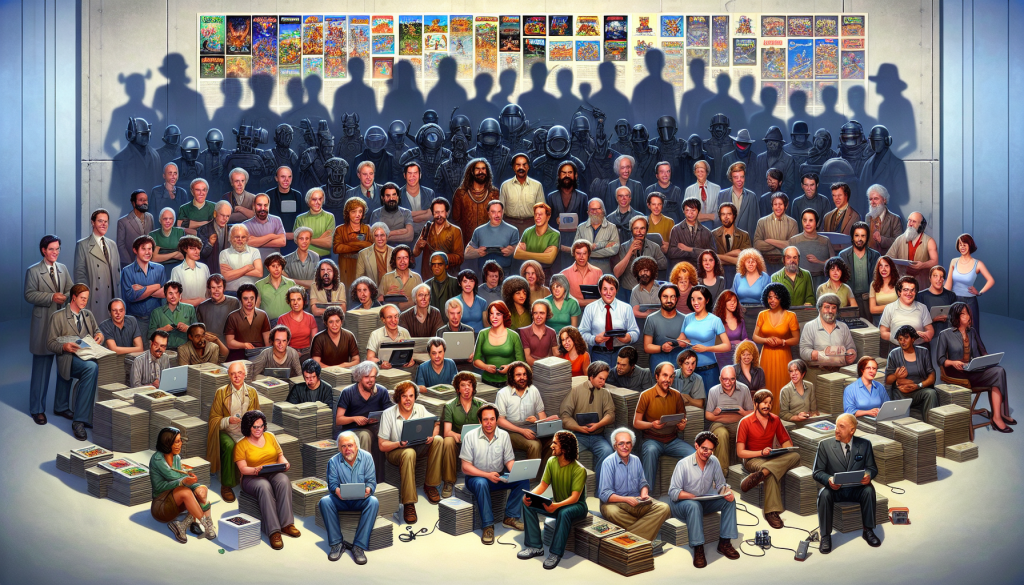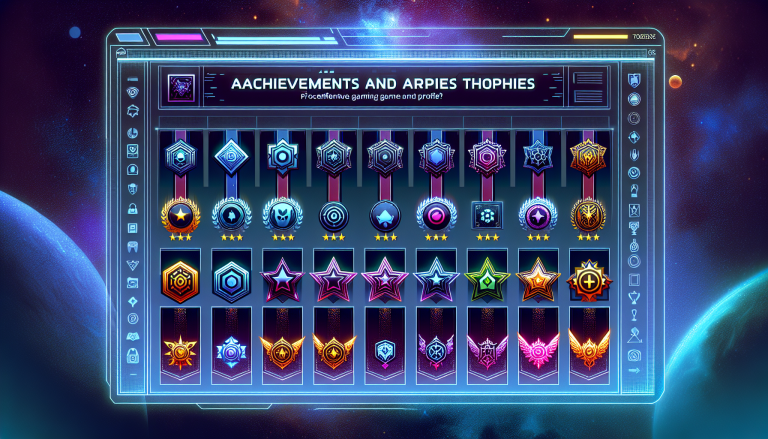Evolution of Classic PC Games: From Text-Based Adventures to Immersive Virtual Worlds
Remember the days when the only way to play games on your computer was through text-based adventures? Those were the humble beginnings of classic PC games. Fast forward to today, and we’re now immersed in virtual worlds that push the boundaries of technology and creativity. But how did we get here? Let’s take a journey through the evolution of classic PC games and see how they have shaped the gaming landscape.
Back in the early days of personal computers, games were often simple and text-based. You would type commands into the computer and read the responses on the screen, using your imagination to visualize the game world. These text-based adventures, like “Zork” and “Adventure,” laid the foundation for interactive storytelling in gaming. They sparked our imaginations and introduced us to the concept of exploring and problem-solving in virtual worlds.
As technology advanced, so did the complexity and graphics of PC games. The introduction of graphical user interfaces (GUI) in the 1980s brought us games like “King’s Quest” and “Monkey Island,” which combined text-based storytelling with colorful visuals. These games allowed us to interact with the game world through point-and-click mechanics, adding a new layer of immersion and interactivity.
Then came the breakthrough of 3D graphics in the mid-1990s. Games like “Doom” and “Quake” transported us into fully realized 3D worlds, where we could navigate and engage with our surroundings in ways we had never experienced before. This marked a turning point in the evolution of PC games, as it paved the way for more complex and visually stunning virtual environments.
As technology continued to evolve, so did the possibilities for PC gaming. The rise of online multiplayer games like “World of Warcraft” and “Counter-Strike” brought a new level of social interaction and competitiveness to the gaming world. Suddenly, players could connect with others from around the globe and collaborate or compete in virtual arenas.
Today, we find ourselves in the age of immersive virtual reality (VR) and augmented reality (AR) gaming. With devices like the Oculus Rift and HTC Vive, we can step into virtual worlds and interact with them in ways that were once unimaginable. Whether it’s exploring ancient dungeons or battling virtual creatures, these games blur the lines between reality and fiction, providing an unprecedented level of immersion.
So, what can we learn from the evolution of classic PC games? Firstly, it reminds us of the power of imagination and storytelling in gaming. Even in the early days of text-based adventures, players were able to create vibrant worlds in their minds based on the simple descriptions on the screen. This serves as a reminder to game developers today that graphics and technology are important, but they should never overshadow the importance of a compelling narrative.
Secondly, it highlights the importance of innovation and pushing boundaries. Every major shift in the evolution of PC games, from text-based adventures to 3D graphics to VR, was driven by developers pushing the limits of what was possible. As gamers, we should embrace and support these innovations, as they not only enhance our gaming experiences but also pave the way for future advancements.
In conclusion, the evolution of classic PC games has been a remarkable journey, from the simple text-based adventures of the past to the immersive virtual worlds of today. These games have shaped the gaming landscape, inspiring creativity, and pushing the boundaries of technology. As we look back on the evolution of PC games, let’s appreciate the nostalgia and enduring appeal of these classic titles, while also embracing the exciting future of gaming that lies ahead.
Hey there, fellow gamers! Today, we’re diving into the fascinating world of classic PC games and their influence on modern gaming. Strap in and get ready for a nostalgic journey that will make you appreciate the roots of the games we love today.
Influence of Classic PC Games on Modern Gaming: Paving the Way for Innovation and Creativity
Think about it – every game you play today owes a debt to the classic PC games that came before. These games were the pioneers, the trailblazers that laid the foundation for the incredible innovation and creativity we see in the gaming industry today.
One of the most significant ways in which classic PC games influenced modern gaming is through storytelling. Back in the day, games were predominantly text-based adventures that relied on players’ imagination to bring the story to life. Titles like “Zork” and “Colossal Cave Adventure” captured the hearts of players by allowing them to immerse themselves in rich narrative worlds. This emphasis on storytelling paved the way for the cinematic experiences we enjoy in games like “The Last of Us” and “Red Dead Redemption 2” today.
But it doesn’t stop there. Classic PC games also introduced us to groundbreaking gameplay mechanics that have become staples in the industry. Take a game like “Doom,” for example. Released in 1993, “Doom” revolutionized the first-person shooter genre with its fast-paced action and intense multiplayer gameplay. This game set the bar for future FPS games and inspired countless developers to push the boundaries of what was possible.
Another area where classic PC games made a significant impact is in the realm of strategy games. Titles like “Civilization” and “Command & Conquer” introduced players to deep, complex gameplay mechanics that rewarded strategic thinking and planning. These games laid the groundwork for modern strategy games like “Sid Meier’s Civilization VI” and “StarCraft II,” which continue to captivate players with their depth and complexity.
It’s also worth mentioning the contribution of classic PC games to the development of multiplayer gaming. Games like “Quake” and “Counter-Strike” paved the way for online multiplayer experiences, allowing players from around the world to come together and compete or cooperate in virtual worlds. These games created a sense of community and camaraderie among players, setting the stage for the rise of esports and competitive gaming we see today.
So, what can we learn from the influence of classic PC games on modern gaming? Well, for aspiring game developers and designers, it’s essential to study the classics and understand the foundations on which the industry was built. By appreciating the innovation and creativity of these games, we can build upon their legacy and continue pushing the boundaries of what is possible in the world of gaming.
And for us gamers, it’s a reminder to pay homage to the classics that shaped our favorite pastime. Take a trip down memory lane and revisit some of these iconic games. Whether it’s firing up a game of “Myst” or embarking on an epic quest in “The Legend of Zelda,” these classics have a timeless appeal that continues to captivate gamers of all ages.
Shaping the Gaming Landscape: Classic PC Games and the Rise of Esports and Competitive Gaming
When we think of classic PC games, we often reminisce about the hours spent exploring virtual worlds, solving puzzles, and battling enemies. These games not only entertained us but also played a significant role in shaping the gaming landscape we see today. One area where classic PC games have had a profound impact is in the rise of esports and competitive gaming.
Esports, or electronic sports, are organized competitive gaming events where professional players compete against each other. It has evolved into a global phenomenon, with millions of viewers and lucrative prize pools. But how did classic PC games contribute to this growing trend?
The Competitive Spirit: Classic PC Games as the Catalyst
Classic PC games introduced players to the concept of competition long before esports became mainstream. Games like “Doom,” “Quake,” and “Counter-Strike” put players in intense multiplayer battles, fostering a sense of camaraderie and rivalry among gamers. These games provided a platform for players to showcase their skills and compete against the best.
Furthermore, classic PC games encouraged players to improve their abilities through practice and strategy. The competitive nature of these games inspired players to strive for excellence, setting the stage for the highly competitive esports scene we see today.
The Rise of Online Gaming: Connecting Players Worldwide
Classic PC games were pioneers in online multiplayer gaming, allowing players to connect with others from around the world. Games like “StarCraft,” “Diablo,” and “World of Warcraft” not only provided immersive experiences but also created thriving online communities.
These communities fostered a sense of belonging and camaraderie, laying the groundwork for the social aspect of competitive gaming. Players formed teams, collaborated on strategies, and forged friendships that extended beyond the virtual realm. This sense of community and connection continues to be a vital aspect of competitive gaming today.
Learning from the Masters: Classic PC Games as Training Grounds
Classic PC games provided a training ground for aspiring competitive gamers. Players could study the strategies and techniques of top players, learning from their gameplay and analyzing their tactics. This learning process allowed players to refine their skills and develop their own unique playstyles.
Today, many professional esports players credit their success to the lessons learned from classic PC games. The ability to adapt, think strategically, and make split-second decisions are skills honed through countless hours spent playing and studying these games.
Continuing the Legacy: Classic PC Games in Modern Esports
As esports continues to grow rapidly, classic PC games still hold a special place in the hearts of many gamers. Tournaments and leagues dedicated to classic games like “StarCraft: Brood War” and “Counter-Strike 1.6” attract a dedicated fan base and showcase the timeless appeal of these games.
The influence of classic PC games on competitive gaming is evident not only in the longevity of these games but also in the way they continue to inspire new generations of players. Many modern esports titles draw inspiration from classic games, incorporating their mechanics and gameplay elements.
In conclusion, classic PC games have played a fundamental role in shaping the gaming landscape, particularly in the rise of esports and competitive gaming. Their competitive spirit, online multiplayer capabilities, and influential gameplay have left a lasting impact on the industry. As we look to the future, it is clear that classic PC games will continue to be revered and appreciated for their contributions to the world of competitive gaming.
Remember those good old days when you would spend hours huddled in front of your trusty computer, engrossed in classic PC games? The thrill of solving puzzles, the excitement of exploring new worlds, and the joy of conquering challenging levels are all fond memories that many gamers hold dear. Fortunately, these iconic games have not been forgotten in the digital age, as they continue to captivate players and experience a resurgence in popularity.
There’s something undeniably special about the nostalgic appeal of classic PC games. They evoke a sense of simplicity, charm, and a hint of innocence that can transport us back to a time when gaming was a treasured pastime. In today’s fast-paced and visually stunning gaming landscape, these games serve as a reminder of where it all began and provide a refreshing break from the constant influx of new releases.
Rediscovering the Classics
Thanks to the ease of digital distribution platforms such as Steam, GOG, and others, classic PC games have once again found their way into the hands of gamers worldwide. Titles like “Myst,” “DOOM,” “Diablo,” and “Baldur’s Gate” have been re-released or remastered, allowing both seasoned gamers and newcomers to experience the magic of these timeless classics.
Whether you’re a fan of adventure, strategy, or role-playing games, there’s a wealth of options available to satisfy your gaming cravings. The vast libraries of classic PC games offer a treasure trove of immersive storytelling, compelling gameplay, and unique mechanics that continue to stand the test of time.
A Gateway to Imagination and Creativity
Classic PC games have not only shaped the gaming landscape but have also paved the way for innovation and creativity in the industry. Many of the game mechanics and storytelling techniques that we take for granted today were developed and refined in these classic titles.
For aspiring game developers, playing and analyzing classic PC games can provide invaluable insights and inspiration. Studying the design choices, narrative structures, and gameplay mechanics of these games can help cultivate a deeper understanding of what makes a game truly engaging and memorable.
Furthermore, the enduring popularity of classic PC games serves as a testament to the power of simple yet captivating gameplay. It reminds us that a game doesn’t need flashy graphics or a massive budget to leave a lasting impact on players.
The Rise of Esports and Competitive Gaming
Classic PC games have played a significant role in shaping the rise of esports and competitive gaming. Games like “StarCraft,” “Counter-Strike,” and “Warcraft III” laid the foundation for the competitive gaming scene we see today, with their strategic depth and skill-based gameplay.
These games fostered vibrant communities of dedicated players who pushed the boundaries of skill and strategy, eventually leading to the formation of professional esports leagues and tournaments. Today, millions of spectators tune in to watch these competitions, cheering on their favorite players and teams.
Classic PC games continue to be a part of the esports landscape, with updated versions and remasters keeping them relevant in the modern gaming world. Their enduring appeal and competitive nature make them ideal candidates for esports competitions, allowing players to showcase their skills and compete on a global stage.
Embracing the Nostalgia
In a world where new games are constantly vying for our attention, it’s comforting to know that classic PC games are still cherished and enjoyed by gamers of all ages. Whether you’re a longtime fan or a curious newcomer, there’s something magical about stepping into the virtual worlds of these timeless classics.
So, why not take a trip down memory lane and revisit some of your favorite classic PC games? Reconnecting with these beloved titles can bring a sense of joy, nostalgia, and discovery. It’s a reminder that gaming is not just about the latest graphics or trends but about the experiences and memories we create along the way.
So, fire up that old PC, dust off your keyboard, and let the adventure begin!












